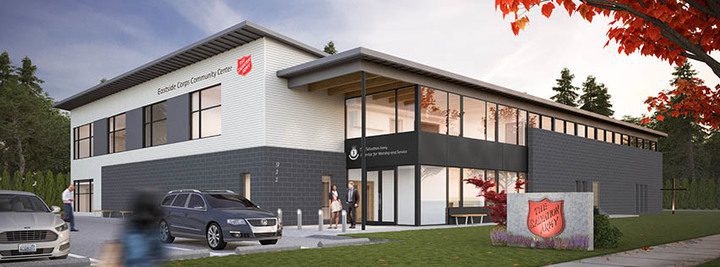Bellevue, Washington-area embraces expanded services at The Salvation Army
By Lizeth Beltran –
Not even a six-figure income can exempt some households from economic distress, according to a recent report from the federal government.
The data, released by the Department of Housing and Urban Development (HUD), stated that a family of four in San Francisco with an income of $105,350 is now considered “low income.”
Though the Bay Area’s HUD income limits are among the nation’s highest, the report has rekindled debate about the need for a sliding poverty scale and the hiddenness of hardship among perceived affluence.
All across the country, communities are faced with a similar reality. In Bellevue, Washington, the annual household income easily eclipses the six-figure mark, and yet many residents who live in the vicinity of The Salvation Army Eastside Corps face a great deal of need.
Residents in the city’s Crossroads neighborhood have relied heavily on the Eastside Corps for a number of services, and the corps’ recent $8.5 million expansion couldn’t have come at a better time.
The corps increased its physical space earlier this year, opening a 17,000 square-foot facility that includes a food pantry, a fellowship hall, several classrooms and a chapel. It’s allowed the corps to serve substantially more residents.
“A lot of times, there’s a family where both parents are working two jobs just to pay the rent,” said Lt. David Aycock, who was appointed last summer as corps officer of the Eastside Corps with his wife, Joleen. “We have many people who come to us asking for help to pay rent or utilities. Many of them have shut-off and eviction notices.”
The majority of families in the Crossroads neighborhood are working-class, some living in government-funded Section 8 housing.
“Housing is so expensive in the area, and many times you’ll find families either living in public housing, Section 8, or in cramped apartments with extended family,” he said. “A lot of the residents are waitresses, gardeners, housekeepers, and child care workers. It’s a lot of service positions where if they weren’t there, the wealthy community in Bellevue would not be able to function…They are barely making ends meet, and we see this every day when we open our kitchen.”
Another welcome addition to the community is the corps’ after-school ministry program where some of Crossroads’ youth can spend time learning music and studying the Bible.
“So many of the kids around here are dismissed from school at 12:30 on Wednesdays,” Aycock said. “With the number of kids whose parents both work during the day, the ministry program has become a place for the kids to go to instead of staying at home alone.”
The program maintains an average attendance of nine students, who meet each week from 12:30 to 5 p.m. for brass lessons, drama and art exercises.
For Joleen Aycock, seeing the youth of Crossroads embrace music is one way she knows they are doing the right thing in this community.
“I had a mother come up to me and cry because her daughter was going to have the opportunity to take music lessons,” she said. “This mother said she never thought her kids would have the chance to take music lessons. It was never in her peripheral.”
Through the after-school program, the Eastside Corps will be sending two students to music camp this summer, an unexpected opportunity for both the students and family.
The Aycocks expected the expansion would allow them to double the amount of people served throughout Bellevue, Redmond, Kirkland, Woodinville, and parts of Bothell. And so far, the corps has done just that. From January to May this year, the corps served 6,712 meals, compared to 3,000 meals over the same period last year.
“When we first opened the new facilities, all we did was hang fliers around the neighborhood,” Joleen Aycock said. “That’s all we had to do, and people found us. It’s the way that we work. All people have to do is come and ask, and we’ll help them any way we can.”

Listen to this article
You May Also Like
Robert James Stillwell | May 15, 1928 – Nov. 30, 2020
Lifelong Salvationist Dr
2 minute read
January 7, 2021










